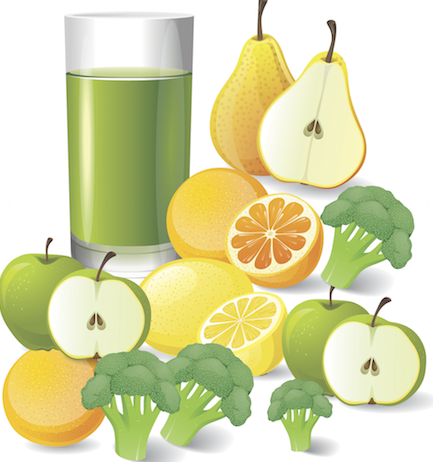
Healthy Eating: Am I Doing It Right?
By Jessica Park
A healthy, balanced diet isn’t just good for weight loss; it can give you energy, keep your body in good working condition and enhance your workouts. You may have resolved to eat healthier this year but don’t know where to begin or what you really need to do to eat healthy. Boone Hospital WELLAWARE registered dietitians Jennifer Anderson (listed as JA), Kelsie Knerr (KK) and Jennifer Tveitnes (JT) answered our questions.
If you want to begin a healthier diet, do you need to start with a detox diet or cleanse?
JA: No. Our bodies naturally “detox.” That’s your liver’s job. You don’t have to do anything more to make your body eliminate toxins.
JT: Detox diets seem to provide more of a psychological benefit. They can make you feel like you’re doing something good for your body, but some of these programs can be potentially harmful and deprive you of nutrients. You can get the same psychological benefit if you throw out your junk food.
What about programs like juice-only diets?
KK: While it’s great to get all those vitamins and minerals, when you juice fruits and vegetables, you don’t get the fiber. Why would you take that amazing thing away? The concentrated sugars in juice will make your blood sugar spike and fall, but keeping the fiber can help bring more stability.
JT: You’re also missing out on protein, calcium and healthy fats by drinking only juice.
JA: Think about how many vegetables it takes to make a little glass of juice — if you ate those vegetables instead, you’d be full!
What about foods that claim to give you more energy, like Bulletproof Coffee? It’s coffee you make with grass-fed butter and a special kind of coconut oil.
JT: Straight fat for breakfast? Three tablespoons of butter is 300 calories!
KK: The majority of the fats in grass fed butter and coconut oil are saturated, I’d prefer you drink your coffee with some nuts on the side to get more unsaturated fats instead.
JT: They’re not as bad for your heart as trans fats, but not as healthy as olive oil. Also, breakfast is a great time to get your proteins, fruits and grains.
KK: I can think of better ways to spend calories at breakfast and much better ways to enjoy butter than eating a big hunk in my coffee.
Can you eat processed foods as part of a healthy diet?
JA: It’s always good to eat more whole foods, but most of us aren’t going to grind our own flour!
JT: There are less or minimally processed foods with less sodium or added sugar and fewer ingredients. If the ingredient list is a mile long, look for an alternative with a shorter list.
KK: You can fit processed foods into a balanced healthy diet. They say to shop the perimeter of the supermarket, but you can find great foods in the aisles, too. Grab some whole-wheat pasta to go with your lean ground beef and tomatoes!
Do fruits and vegetables need to be organic to be healthy? Organic produce can be rather expensive.
JT: We’d prefer you eat non-organic fruits and vegetables than not eat them at all because you can’t afford organic.
JA: In the summer, I encourage people to go to a farmers market, where you can find fresh and local produce at a good price. You can freeze and store produce to enjoy later in the year. You can also grow your own fruits and vegetables. I have a garden where I grow tomatoes and peppers. My cherry tomatoes have much more flavor than store-bought ones.
Do you need to eat superfoods to be healthy?
JA: Superfoods is a term used for some foods with high nutritional value, but you can get those nutrients from other foods.
JT: It’s important to eat a variety, too. If I ate kale every day, I’d go crazy!
KK: You shouldn’t worry about eating spinach instead of kale. They’re both good for you. We’re just happy if there’s something green on your plate. Don’t feel like you’re doing it wrong if you eat a fruit or vegetable that’s not called a superfood.
What about foods or supplements that claim to prevent or cure medical conditions?
JA: If a product says it cures something, I would be wary. Anything that says it’s a miracle cure probably isn’t.
JT: If something was a miracle cure, everyone would already know about it.
JA: And no single vitamin or mineral is proven to treat or prevent specific health problems. It’s actually impossible to pinpoint the effects of any vitamin, mineral or other nutrient, because they all work together.
If you’re considering meeting with a professional to talk about a healthy diet plan, what’s the difference between a dietitian and a nutritionist?
JA: A registered dietitian is required to have a four-year college degree, do an internship, pass a registration exam and take continuing education.
JT: A registered dietitian is a nutritionist, but not all nutritionists are registered dietitians. You want to see those two words!
KK: Also, insurance plans only cover nutritional counseling provided by registered dietitians.
Is it possible to take healthy eating too far?
JA: Yes. There’s a word for it: orthorexia. That’s when you become obsessed with what you’re eating and preoccupied with what you’re going to eat next. You might even eliminate foods that are actually healthy. If your diet is too restrictive, you might skip social outings or miss family gatherings.
JT: And healthy eating doesn’t have to be hard.